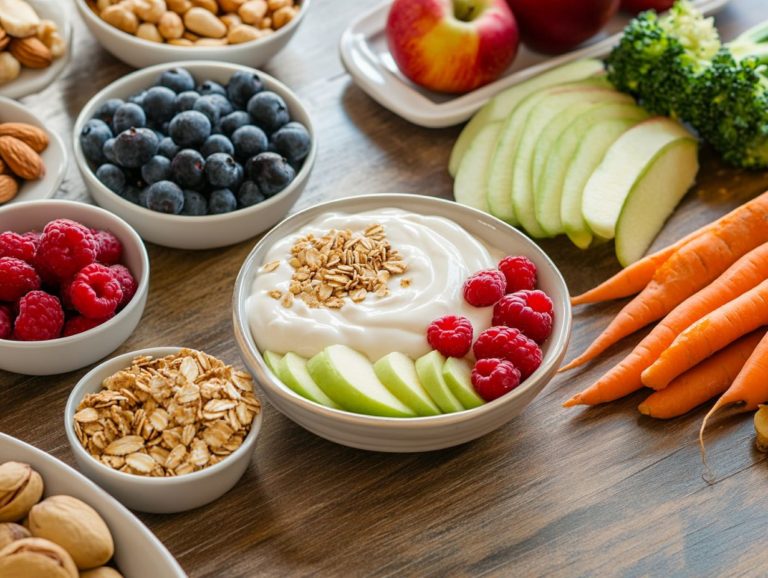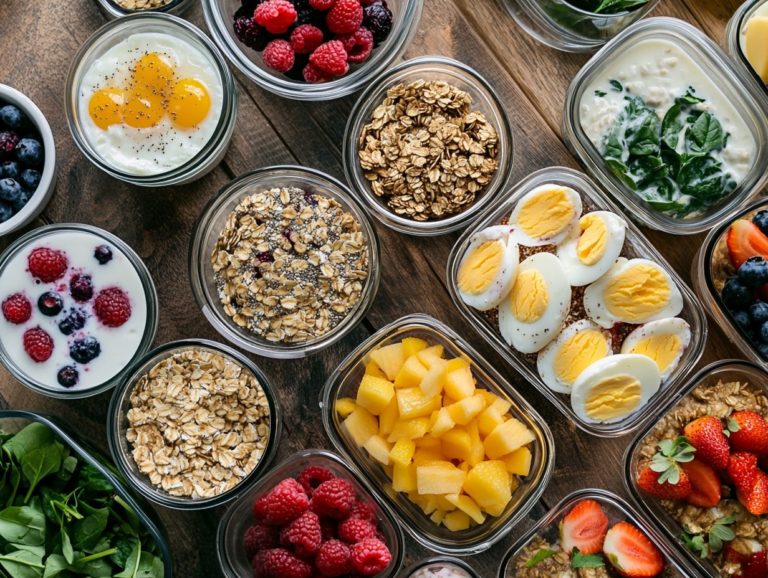How to Plan Meals for Better Digestive Health
A healthy digestive system is essential for your overall well-being, impacting everything from how well you absorb nutrients to your immune function.
This article delves into the key factors that influence digestive health, particularly your diet and lifestyle choices. You ll learn how to craft a balanced meal plan filled with essential nutrients, tailor meals to tackle specific digestive concerns, and seamlessly incorporate probiotics and prebiotics into your daily routine.
Get ready to unlock the secrets to a happier gut today!
Contents
- Key Takeaways:
- Factors Affecting Digestive Health
- Creating a Balanced Meal Plan for Digestive Health
- Meal Planning Tips for Specific Digestive Issues
- Incorporating Probiotics and Prebiotics into Your Diet
- Other Strategies for Improving Digestive Health
- Frequently Asked Questions
- What is the connection between meal planning and digestive health?
- Discover the top foods to include in your meal plan for amazing digestive health!
- What foods should I avoid in my meal plan for better digestive health?
- How can I meal prep for better digestive health when I have a busy schedule?
- Are there any specific meal planning strategies for individuals with specific digestive health issues?
- Can meal planning really make a difference in my digestive health?
- How can I meal prep for better digestive health when I have a busy schedule?
- Are there any specific meal planning strategies for individuals with digestive health issues?
Key Takeaways:

A healthy digestive system is crucial for overall well-being. A balanced meal plan that includes key nutrients and gut-friendly foods can promote better digestion. Incorporating probiotics, managing stress, and exercising regularly are additional ways to support digestive health.
Understanding the Importance of a Healthy Digestive System
A healthy digestive system is vital for your well-being. It plays a crucial role in how your body absorbs nutrients and supports your immune system.
Your gut health also affects your mood, showing how dietary choices can elevate your overall wellness. Jeannette Hyde highlights this in her book, “The Gut Makeover,” which focuses on restoring gut balance.
This complex system serves as the foundation for key bodily functions. It affects how your body utilizes nutrients and how your energy levels fluctuate throughout the day.
When you prioritize enhancing your gut health through tailored dietary adjustments, you may notice improvements in weight management and a bolstered immune response. A diverse microbiome, as Hyde emphasizes, contributes to optimal digestion and helps regulate your mood, illustrating the remarkable connection between what you consume and how you feel.
By adopting a holistic approach that includes prebiotics and probiotics, you can cultivate a thriving gut environment. Prebiotics are types of fiber that feed healthy bacteria in your gut, while probiotics are live bacteria that can benefit your digestive system, leading to a multitude of health benefits.
Factors Affecting Digestive Health
Several factors can profoundly impact your digestive health, including your lifestyle choices, dietary habits, and even the environment around you.
Consuming processed foods and excess alcohol may disrupt the delicate balance of healthy bacteria in your gut, resulting in a range of digestive issues.
Food intolerances and autoimmune disorders can amplify these concerns, highlighting the importance of embracing holistic dietary interventions designed to restore gut function and enhance your overall digestive wellness.
Diet, Lifestyle, and Other Influences
Diet and lifestyle are pivotal in maintaining gut health. It s essential to make dietary changes to achieve a balanced microbiome and enhance overall wellness.
Incorporating more fiber-rich foods, plant-based options, and nutritious fats into your meals can support your digestive health. Engaging in mindful eating practices can further elevate your relationship with food, enabling you to meet your nutritional needs while addressing any underlying digestive concerns.
These modifications not only boost your digestion but also contribute to a richer diversity of beneficial microbes in your gut. A balanced microbiome can impact everything from immune function to mental health.
By opting for whole, unprocessed foods and practicing mindfulness during meals, you can develop a more intuitive understanding of your body s cravings and responses. Embracing these holistic approaches can enhance your energy levels and reduce inflammation, ultimately leading to a healthier, more vibrant lifestyle that nurtures both your physical and mental well-being.
Creating a Balanced Meal Plan for Digestive Health
A well-planned meal plan is essential for promoting digestive health, supplying vital nutrients, and cultivating a balanced gut environment.
By prioritizing a gut health diet that features nutrient-dense foods, healthy fats, and a variety of cooking techniques, you can significantly enhance the functionality of your digestive system.
Eating a variety of foods boosts microbiome diversity and meets your nutritional needs, establishing a robust foundation for overall wellness and increased energy.
Key Nutrients and Foods to Include
To truly support your gut health, it s essential to incorporate key nutrients and foods that enhance your digestive function and cultivate a balanced microbiome.
Foods rich in fiber, such as prebiotic vegetables and probiotic-packed fermented delights, play a crucial role in maintaining healthy bacteria levels within your gut. By integrating options like oats, chia seeds, and legumes into your daily meals, you can significantly boost your fiber intake, promoting regularity and warding off discomfort.
Probiotic sources like yogurt, kefir, and sauerkraut introduce beneficial bacteria to your digestive tract, enhancing the diversity of your gut flora. These foods do more than just support digestion; they also improve nutrient absorption and bolster your immune function.
Try out these tasty gut-friendly recipes!
- A hearty lentil soup brimming with onions and garlic for those prebiotics
- A refreshing yogurt parfait topped with berries
This approach makes healthy eating not only enjoyable but effective, too. Ultimately, embracing these nutrient-rich ingredients will lay a strong foundation for improved digestive health and overall well-being.
Meal Planning Tips for Specific Digestive Issues

Meal planning serves as a powerful ally in addressing specific digestive issues, enabling you to tailor your dietary interventions with precision.
By pinpointing your unique gastric symptoms and understanding their triggers, you can craft a personalized approach that not only alleviates discomfort but also supports weight loss and enhances overall gut health.
This method empowers you to take control of your digestive wellness, ensuring that each food choice promotes your well-being.
Addressing Common Digestive Problems
Common digestive issues, like heartburn and food intolerances, can truly disrupt your quality of life, demanding careful management through thoughtful dietary adjustments. Tackling these complaints often means identifying your food triggers and making informed choices that promote the healing of your gut lining.
By embracing a gut-supportive diet and exploring dietary changes, you can experience a noticeable decrease in heartburn and effectively manage associated symptoms.
Understanding which foods to avoid while opting for those that genuinely nourish your digestive system is essential. Incorporating whole grains, lean proteins, and a rich variety of fruits and vegetables can help you restore balance.
You might also consider cutting out processed foods and artificial additives, as they can worsen your symptoms. Keeping a food diary can be a valuable tool in pinpointing any intolerances, while probiotics can bolster your gut health, enhancing your overall digestive experience.
Take charge of your digestive health today!
Incorporating Probiotics and Prebiotics into Your Diet
Incorporating probiotics and prebiotics into your diet is essential for nurturing gut-friendly bacteria and elevating your overall digestive health.
Probiotic foods, like yogurt and other fermented products, introduce beneficial microorganisms that help restore balance within your microbiome. Meanwhile, prebiotic vegetables act as nourishment for these healthy bacteria. (Probiotics are good bacteria found in certain foods, while prebiotics are types of fiber that feed these bacteria.)
Together, they offer remarkable health benefits, including enhanced digestion and a more robust immune response.
Benefits and Sources of Gut-Friendly Bacteria
The benefits of gut-friendly bacteria go well beyond mere digestion; they hold the key to various facets of your health and well-being. Probiotic foods and fermented options are excellent sources of these beneficial microorganisms, enhancing nutrient absorption and fostering a balanced gut bacteria.
Recognizing these health advantages helps you make informed dietary choices. This cultivates a thriving digestive system.
These microorganisms play a crucial role not just in breaking down your food, but also in bolstering your immune system. They significantly reduce the risk of infections and inflammatory conditions.
Incorporating diverse options like yogurt, kefir, sauerkraut, and kimchi into your diet introduces a wealth of beneficial strains to your gut. These foods are rich in live cultures, which enhance digestion and can help alleviate common issues like bloating and irregularity.
Gut-friendly bacteria can brighten your mood and sharpen your mind! Embrace the power of a healthy gut for a vibrant life.
By increasing your awareness of these options, you can harness the power of a healthy gut to elevate your vitality and wellness.
Other Strategies for Improving Digestive Health
Enhancing your digestive health requires a holistic approach that goes well beyond just tweaking your diet. It encompasses exercise, stress management, and a variety of lifestyle factors.
Engaging in regular physical activity not only boosts gut motility but also elevates your overall wellness. This makes it a vital part of a healthy lifestyle.
Mastering stress management techniques significantly boosts your digestive health. This sets the stage for a truly successful wellness journey.
Exercise, Stress Management, and More
Both exercise and stress management are crucial for enhancing your digestive health. They deeply influence your overall well-being.
By engaging in regular physical activity, you support your digestion and reduce stress, which often intertwines with various digestive issues.
Integrating strategies for exercise and stress reduction can be powerful allies in your wellness journey. Incorporating simple activities like brisk walking or yoga into your daily routine can significantly facilitate digestion while providing a buffer against stress.
Aiming for at least 30 minutes of moderate exercise most days invigorates your gut health and promotes relaxation. Techniques like mindfulness and deep breathing exercises also play a critical role in managing your stress levels, ultimately benefiting your digestive function.
Establishing a balanced routine that blends these activities equips you with practical tools to enhance your overall well-being. By making these small yet impactful changes, you can nurture a healthier lifestyle that supports both your mind and body.
Frequently Asked Questions

What is the connection between meal planning and digestive health?
Meal planning involves intentionally choosing and preparing foods that are beneficial for the digestive system. This can help prevent digestive issues such as bloating, gas, constipation, and diarrhea.
Discover the top foods to include in your meal plan for amazing digestive health!
Some key foods to include in your meal plan are high-fiber fruits and vegetables, fermented foods like yogurt and kimchi, and lean sources of protein such as chicken, fish, and tofu. It’s also important to include probiotic-rich foods like kefir, sauerkraut, and miso.
What foods should I avoid in my meal plan for better digestive health?
Foods that are high in fat, sugar, and processed ingredients can be difficult for the digestive system to break down. These include fast food, fried foods, sugary snacks, and highly processed snacks. It’s best to limit or avoid these foods in order to promote better digestive health.
How can I meal prep for better digestive health when I have a busy schedule?
One way to meal prep for better digestive health is to batch cook on the weekends and freeze individual portions for the week. This way, you can quickly reheat and enjoy healthy, homemade meals without spending too much time in the kitchen during the week.
You can also opt for simple meals like salads or smoothies that require minimal prep and can be easily customized for digestive health.
Are there any specific meal planning strategies for individuals with specific digestive health issues?
Consider consulting with a healthcare professional to tailor your meal planning strategies according to specific digestive health issues.
Take charge of your digestive health today! Start incorporating these foods and practices into your routine for a happier gut.
Can meal planning really make a difference in my digestive health?
Meal planning significantly impacts digestive health. Choose your foods carefully. Including gut-friendly ingredients can improve digestion and reduce discomfort.
How can I meal prep for better digestive health when I have a busy schedule?
Batch cook on weekends and freeze individual portions. This way, you can enjoy healthy meals without spending too much time cooking during the week!
Opt for simple meals like salads or smoothies that require minimal prep and can be easily customized.
Are there any specific meal planning strategies for individuals with digestive health issues?
A low FODMAP diet limits certain carbohydrates that can trigger digestive issues. A gluten-free diet excludes wheat and related grains.






